

The Thin Red Line (1964)
Set during the Allied invasion of the island of Guadalcanal in the Pacific theater during WWII, this film is based on the novel by James Jones. Keir Dullea is Private Doll, who dreads the invasion and steals a pistol to help him protect himself. Sergeant Welsh (Jack Warden), a caustic, battle-scarred veteran, hates Doll, whom he considers a coward. In battle, Doll kills a Japanese soldier and is filled with remorse, which further angers the sergeant. The next day, an emboldened Doll wipes out an entire enemy machine gun post and begins to feel as sadistic as Welsh. The two must work together to clear away some mines, but as they do, their platoon is surprised by a Japanese raid.
Watch Trailer
Cast


Similar titles
Reviews
The Age of Commercialism
Lack of good storyline.
All of these films share one commonality, that being a kind of emotional center that humanizes a cast of monsters.
Through painfully honest and emotional moments, the movie becomes irresistibly relatable
British actor Terence Hardiman, who played an abbot in the excellent series "Cadfael" and a Luftwaffe major in another excellent British TV series "Secret Army" had a tiny bit role in the movie. He appears as a survivor in the aftermath of a vicious firefight with Japanese troops, grouped around the colonel who hastily arrived at the sight to inspect the conditions of his men. I suppose he was just a nobody at that time.This is a highly recommended black and white film for war movie buffs. Very rarely aired on TV.
"A new motto: If you can't trans-cend, you might as well des-cend. I'm scoping out the bottom here....Mass, Density. Permanence. Finality. Termination. Rock. Even the word conveys heft, a certain assurance. No loss of focus here." – "Meditations in Green" (Stephen Wright)Film lags behind most other fields, mediums and art-forms, and so its no surprise that even over half a century after its release, few war films have been able to match the power of James Jones' novel, "The Thin Red Line".The second book in his WW2 trilogy, Jones' novel told the story of Charlie company and their participation in the battle of Guadalcanal. But what stood out about "Line" was the way it read more like a Vietnam precursor than a novel about WW2. Having himself fought at Guadlacanal, Jones had no time for the usual "greatest generation" and "noble war" fabrications. His novel was filled with drunks, cowards, thieves, sodomites, slackers, homosexuals and only occasionally heroes. His grunts battled mind-numbing tedium, fatigue, disease, nature, each other and their officers as much as they did the Japanese, and when victories were won, they were fairly meaningless. "It's just a fight over property," one character sighs.But for Jones, war was more than an overpowering injustice. His characters were separated into those who found themselves trapped in an indeterministic universe, wholly overwhelmed by circumstance, and those who turned war into a private struggle, a means of finding existential authenticity. This polarity is typical of war novels of the era, the theme of individuals as mere cogs in the war machine introduced by master authors like Dos Passos ("Through the Wheat" and "Three Soldiers") and Thomas Boyd and carried on in the works of artists like Norman Mailer, Joseph Heller, Stephen Wright, William March, and James Jones. Heavily influenced by post war existentialism, all these novelists offered only the faintest suggestion of hope for the individual.So beyond war, these artists used combat as an avenue to examine the plight of the individual caught up in and beleaguered by our twentieth century industry culture, the battlefield experience standing in for political and social cognition in our time. Norman Mailer's "The Naked and the Dead", for example, envisions a ruthlessly naturalistic world in which the so-called "rugged individual" is non-existent. Those who aspire to that state, such as Mailer's Sergeant Croft, are inevitably thwarted by circumstance. Likewise the heroes of William March's "Company K", Mailer's "The Naked And The Dead" and Heller's "Catch 22", all centring on characters trying to take a stand for personal, existential freedom against impossible odds. For these authors, free choice is not possible; we choose based upon economic necessities, upon psychic drives, or upon the indoctrination of our social upbringing.The intersection of this impotence with the impersonal, parasitic nature of warfare (war as a grotesque extension of the corporate/economic/political world), turns up again in Jones' own "The Thin Red Line", where the author has his characters Bell and Welsh see the individual as irrelevant and of little interest or worth to anyone but himself, whilst his characters Doll and Fife are shown to be nothing but a reflection of the opinions of others.But Jones always went further than trendy existentialism and one-note defeatism. What his novels did was set up oppositions, or opposing ideologies, and set them at war. Observe how he has one pair of characters embody different philosophical positions: for one soldier, if a human's actions are beyond his or her control, then the cause of war is irrelevant and inescapable. For the other, if war is a product of human choice, then three general groupings of causation - biological, cultural, and reason – can be identified and confronted.This method of philosophical investigation continues throughout the novel. Another pair of characters, for example, battle over whether or not war is ever morally justifiable. One symbolises war (or non-confrontation) from an ethical perspective – akin to St Aquinas' writings on "Just War" - while the other views war as an all-pervasive phenomenon of the universe. Such a description corresponds to a Heraclitean ("War is the father of all things") or Hegelian philosophy in which change (physical, social, political, economical, etc) can only arise out of conflict.Sandwiched between the WW2 masters and the next wave of great war novelists (Michael Herr, Neil Sheehan, Robert Mason, Philip Caputo, Gustav Hasford, Michael Maclear), director Andrew Marton's film adaptation of Jones' "Line" is an odd beast. It doesn't have the thematic weight or dramatic power of Jones' novel, but in the context of the other (mostly dumb) war movies released in the late 50s and early 60s, it's a remarkable film, an odd clash between grungy New Wave aesthetics, raw (not quite method) acting, and the stiff conventions of Old Hollywood. Unfortunately the film received little promotion and quickly faded into obscurity and is today mostly known for featuring an early performance by actor Keir Dullea.Decades later, "Line" would once again be adapted, this time by director Terrence Malick. Upon its release, many derided Malick's film for revoking or reversing the philosophy of Jones' novel, writers painting Malick as some kind of hippie spiritualist who turned war into a "natural", "poetic thing", a stark contrast to the cold, industrial and absurdist universe of Jones. Such a misreading is common, but not true.7.9/10 – Few war movies pass my BS-meter, but this one creaks through. These platoon movies tend to have a smallness – a myopia typical of a grunt's-eye-view - which is very unsatisfying, but Jones' writing is so strong, his lingo so beautiful, that Marton's flick is elevated by dint of sheer association. Even an auteur like Malick is massively indebted to Jones, some of the best moments and characters in his adaptation (Malick's cynical Sean Penn character even pops up in many of Jones' short stories – a surrogate for the writer) owing a lot to Jones' pen.
Detailing the battle on the South Pacific Island of Guadalcanal in 1943 and the Americans' final success over the Japanese, this is a most poignant and underestimated war film. Seen through the narrator, one of the American soldiers, the film's strength lies in its depiction of the harshness, misery, madness, and yet also the depth of humanity, on both sides. There are no winners here. Superb acting all round from the plethora of well-know actors, this extraordinary film leaves you pondering about life long after the credits have rolled on by. It reminds me how fortunate I am not to have been forced to be a soldier as I could not do what so many have been, are still in parts of the world, made to do on behalf of their governments, or renegade armies. May we be forgiven for all the suffering humankind has meted out on other fellow human beings.
Like some other commenters, I saw the 1998 version before seeing this version. I had expected a somewhat jingoistic war film, but was surprised that this turned out to be superior to the 1998 remake in every way but one. Of course the one aspect that was lesser was the depiction of graphic violence, and that was only due to the changing times and audience, and modern film effects that can show things more realistically in graphic fashion. However, I do not consider this a positive, but only stating that the technical ability to show graphic violence has improved. I would say that the story in this one is more engaging, more concise and without losing the effect of alienation that both try to convey, and in fact that effect is much more visible here in this depiction. I found the acting to be solid and less melodramatic than the 1998 version, and the soldiers actions all ring true to what would have been going on in WW II at Guadacanal, without hystrionics. It's quite interesting that this version, coming right before the Vietnam era would be cynical about war but also considerably mindful of the necessity of the particular war it depicts and of the need for the soldiers to do as they did. Whereas the post-Vietnam 1998 version is also cynical, yet much more so, showing the military as a bumbling bureaucracy of sorts and attempting to depict the battle as pointless, extending that depiction to the war in general, and it actually is an unstated allegory about Vietnam. I would say that the 1998 film boasts a production group fairly unaware of the overall reality of WW II, and still stuck in the miasma of Vietnam.














